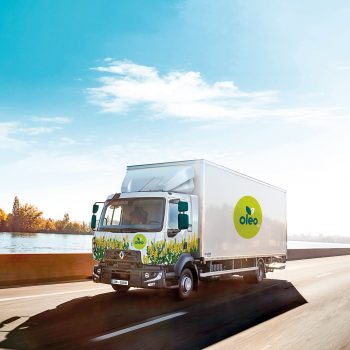Oleo100, the renewable fuel made from French rapeseed, is becoming a more important part of Saipol’s offer. Intended for the captive fleet of trucks and buses, it is increasingly appealing to public works companies for diesel-powered construction equipment, which, from July 2021, will see an increase in taxation for non-road diesel. Driving with Oleo100 also means meeting the requirements of calls for tender to reduce CO2 emissions.

The Covid 19 crisis revealed in 2020 what Saipol already foresaw in 2018 when the company launched its biobased fuel Oleo100, made from 100% French rapeseed, which reduces greenhouse gas emissions by at least 60%: the consumer wants local and renewable energy. It is therefore not surprising that, despite a volume delivered below projections in 2020, due to the cessation of the movement of people and goods, the order books for the year 2021 are full. Contracts are signed for 3 to 5 years! And the momentum will not stop here, as Saipol is aiming for 300,000 m3 of Oleo100 in 2025, compared to 80,000 in 2021, or 5% of the fuel market. “This is the maximum we can provide”, explains Claire Duhamel, director of the activity. “This is because the oil used to manufacture Oleo100 is above all a raw material that complements that used for food purposes in order to make the most of the rapeseed grown in France. ”
Energy transition accelerator, in 30 days!
With these prospects, Oleo100 is one of the flagships that should bring green money to Saipol’s accounts. Claire Duhamel, considers it with regard to her clients as “an easy and accessible lever at no extra cost to accelerate the energy transition in the transport sector”. It is aimed at captive fleets of diesel vehicles and has the advantage of requiring only an engine tune-up by the manufacturers. The company also supplies the fuel tank. So, without hesitation, it promises any carrier: “30 days to decarbonise an entire truck platform ”.
The offer is well established. The department for which she is responsible operates like a start-up company but has the security and support of a group. “We are very agile,” she says, “so much so that every 15 days we may have to review our operations if necessary. ” Operations rely on digital technology, which provides much more modern management of the supply chain to meet all demands.
A boost in tax and environmental pressures
While in 2018 the first customers operated in the goods transport sector, mainly in the food industry, in 2021 the company can count on new segments such as the construction industry, forklift truck operators and public works companies. Eiffage, Vinci, Eurovia, Granulat-Vicat, just to name but a few, are converting their machines to Oleo100 for two main reasons: “This growing interest is due to regulations but also to the environmental commitment of companies”, adds Claire Duhamel. The abolition of the tax advantage on non-road diesel from 1 July 2021 is an important economic factor for companies using construction equipment. Another lever is that tender specifications increasingly require a significant reduction in CO2 emissions. And for those waiting for the hydrogen engine, she sees no prospects for another five years. In any case, the choice of B100 or diesel engines suitable for Oleo100 will be part of the energy mix by that time.

“With the Oleo100 offer, we are very agile, able to respond very quickly to all requests from transporters or equipment manufacturers wishing to accelerate their energy transition. ”
Le mois dernier, grâce au savoir-faire des équipes du groupe @Avril, les membres de la communauté @Oleo100_FR ont reçu leurs attestations de #durabilité, permettant ainsi d'attester de leur réduction réelle des émissions de #CO2 pour l'année 2020. pic.twitter.com/46mGsVK5K4
— Oleo100 (@Oleo100_FR) March 3, 2021
[#Actualités] 200 clients !
— Oleo100 (@Oleo100_FR) February 8, 2021
Un nouveau cap de franchit pour l'énergie du groupe @Avril
Merci à nos partenaires et collaborateurs : France Benne, @AstreTL, @REUNIRmobilite, @FNTVFrance, @EcoCO2 , @RenaultTrucksCo , @ScaniaGroup, @VolvoTrucks, @DAFTrucksFrance, @VolvoBusGlobal pic.twitter.com/ym93PtoaO0


